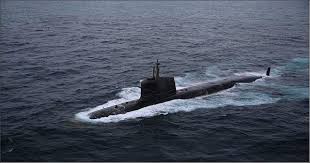DefenceNiti
India’s #1 Defence News | Strategy, Technology, Careers
India’s Project 75 Alpha: Nuclear-Powered Submarines to Rule the Indian Ocean by 2032
By DefenceNiti Editorial Team | October 13, 2025

India’s Project 75 Alpha, a ₹1.2 lakh crore initiative led by the Defence Research and Development Organisation (DRDO) and Indian Navy, aims to induct six nuclear-powered attack submarines (SSNs) by 2032, enhancing maritime dominance in the Indian Ocean Region (IOR). With 70% indigenous content, these 6,000-tonne SSNs, featuring pump-jet propulsion and vertical launch systems (VLS) for BrahMos and NASM missiles, counter China’s expanding People’s Liberation Army Navy (PLAN) and Pakistan’s Hangor-class submarines. Building on Operation Sindoor’s coastal strike success, Project 75 Alpha integrates with Akashteer and LODN, cementing Atmanirbhar Bharat and securing India’s strategic interests from Malacca Strait to the Persian Gulf.
Strategic Imperative: Countering Maritime Threats
Launched in 2022, Project 75 Alpha addresses the growing naval threat from China’s 70+ warships, including three aircraft carriers, and Pakistan’s $1.5 billion Hangor-class submarines, deployed post-Operation Sindoor. The operation showcased India’s BrahMos precision but exposed gaps in underwater endurance against PLAN’s Type 093 SSNs and Pakistan’s submarine patrols near Gwadar. With a 30-day submerged capability and 20-knot speed, these SSNs ensure India can patrol 3,000 km ranges, block PLAN’s supply lines, and deter Pakistan’s subsurface threats in the Arabian Sea.
Technical Excellence: A Silent Predator
Designed with Mazagon Dock Shipbuilders Limited (MDL) and L&T, Project 75 Alpha SSNs feature a 190 MWt pressurized water reactor (PWR), developed by Bhabha Atomic Research Centre (BARC), offering unlimited range limited only by crew endurance. The pump-jet propulsion ensures near-silent operations (noise <100 dB), evading sonar detection by China’s Type 056 corvettes. Equipped with 8 VLS tubes for BrahMos and NASM missiles, plus 6 torpedo tubes for heavyweight torpedoes, the SSNs deliver a 500 km strike range. The July 2025 keel-laying for the first SSN at Visakhapatnam marked a milestone, with sea trials planned for 2030.
| Feature | Specification/Details |
|---|---|
| Displacement | 6,000 tonnes |
| Propulsion | 190 MWt PWR, pump-jet |
| Speed | 20 knots (submerged) |
| Range | Unlimited (30-day endurance) |
| Armament | 8 VLS (BrahMos, NASM), 6 torpedo tubes |
| Indigenous Content | 70% (MDL, L&T, BARC) |
| Deployment | 6 SSNs by 2032 (IOR, Andaman) |
| Cost | ₹1.2 lakh Cr for 6 units |
Integration with Akashteer’s AI-driven command and LODN’s 250 km optical sensors enables real-time targeting of PLAN carriers, while synergy with Project Kusha and S-400 protects Indian naval bases from air threats.
Strategic Impact: IOR Supremacy
Operation Sindoor’s success in crippling Pakistan’s coastal assets underscored the need for persistent underwater presence to counter China’s 60+ submarine fleet and Pakistan’s Hangor-class, which threaten India’s trade routes. Project 75 Alpha’s SSNs, deployable from Andaman to Aden, can shadow PLAN’s Liaoning carrier group or block Pakistan’s Gwadar port in under 48 hours. The program creates 25,000 jobs in Visakhapatnam and Mumbai, boosting MSMEs like Tata Power for reactor components. Its export potential to QUAD allies like Australia aligns with India’s hypersonic missile program, strengthening IOR security.
Challenges and Future Horizons
Challenges include scaling PWR production and integrating VLS systems, with 2028 trials targeting BrahMos compatibility. Delays in titanium hull fabrication could push timelines, but DRDO’s collaboration with IIT Kanpur mitigates risks. By 2035, SSNs will carry hypersonic NASM variants, complementing Directed Energy Weapons (DEWs) for multi-domain dominance. Navy chief Admiral Dinesh Tripathi’s October 2025 Kochi speech emphasized, “Submarines are our silent strength,” underscoring Project 75 Alpha’s role in India’s maritime strategy.
Explore More:
Zorawar Light Tank for High-Altitude Warfare – Ground defence for border security.
India-UK £350M Missile Deal – Enhancing multi-layered defence.
Post-Op Sindoor: Pakistan’s Underground Airbases – Context for maritime threats.
DRDO’s LODN Stealth Detection – Optical synergy for targeting.
S-400 Upgrades – Complementary air defence network.
Project Kusha – India’s SAM for multi-layered defence.
Hypersonic Missile Program – Strategic offensive synergy.
Akashteer System – Networked command for maritime defence.
Sources: Consolidated from IDRW, NDTV, DRDO, and ORF as of October 13, 2025.
DefenceNiti.com: Empowering India’s Defence Awareness | #Project75Alpha #AtmanirbharBharat #IndianNavy



